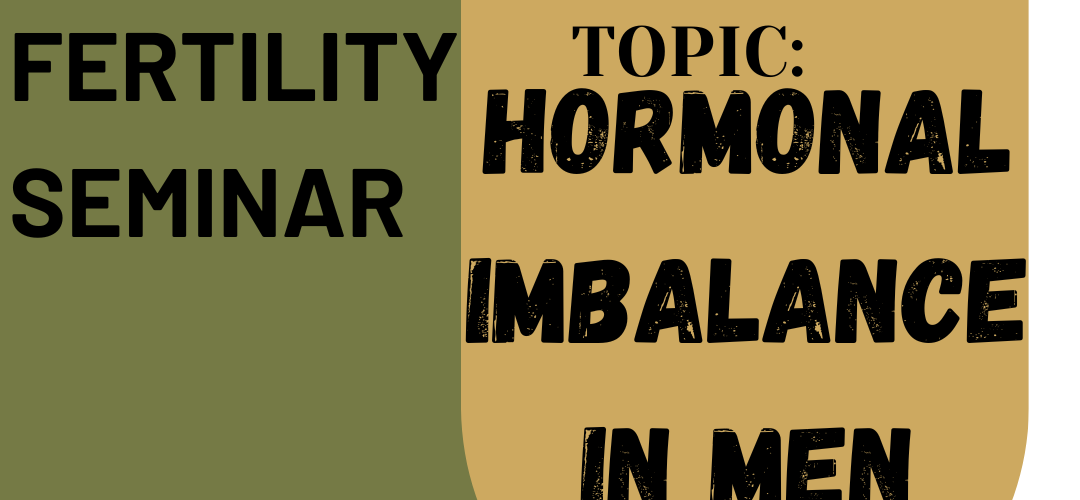HORMONAL IMBALANCE IN MEN
What are hormones?
Hormones are chemicals of the body produced by glands of the endocrine system, which function by delivering various messages to tissues in the body via the blood. They regulate major body processes like metabolism, growth, and reproduction.
Hormonal imbalance occur when there is too much or too little of a hormone present in the body. There are various hormones in the body, and an imbalance in them can affect a number of bodily functions, including:
▪︎Metabolism
▪︎Heart rate
▪︎Sleep cycles
▪︎Reproductive cycles
▪︎Sexual function
▪︎Growth and development
▪︎Mood
▪︎Body temperature
Focusing on our topic today, we want to look specifically at hormonal imbalance in men that affect Reproduction and Sexual functions.
The hormone mainly responsible for Reproduction and Sexual Function in men is *TOSTESTORONE*.
A drop in testosterone is also known as hypogonadism, or “male andropause.”
Hormone levels may fluctuate over time, but it’s more likely to occur as a man grows older.
Hormone fluctuation can also occur due to some lifestyle factors like
▪︎ Stress
▪︎ Injury
▪︎ Illness
▪︎ Poor nutrition with emphasis on excess sugar.
▪︎ Lack of exercise.
This can occur at any time in a man’s life, and their reversal usually leads to a reversal of the hormonal imbalance.
SYMPTOMS OF LOW TESTOSTERONE IN MEN
The following symptoms when noticed in a man, may signify low levels of TESTOSTERONE;
1. Gynaecomastia(breast development )
2. Low libido
3. Erectile Dysfunction
4. Abberant Mood changes
5. Loss in muscle mass/strength
6. Reduced bone strength and density
7. Weight gain/Obesity
8. Loss of body hair
9. Smaller/softer testicle
10. Easy fatigability
Some of these symptoms however can also be caused by other conditions different than low testosterone. Such conditions include:
• Age
• Depression
• Heart disease
• Chronic illness
• Insomnia
• Certain drugs like opiates, antihypertensive and steroids
• Thyroid disorders
• Endocrine disorders
• Pituitary tumors
• Cushings disease
• Addisons disease
• Congenital adrenal hyperplasia
•Anemia
•Diabetes
•Kidney disease
•Liver disease
•Chronic obstructive pulmonary disease (COPD)
•Testicular injuries
•Pituitary gland problems
•Radiation therapy
•Chemotherapy
These diseases however, may not be associated with infertility.
INVESTIGATIONS FOR LOW TESTOSTERONE
When the above symptoms are noticed persistently even after efforts to alter lifestyle, proper investigations should be carried out by medical professionals.
Tests that can be done include:
✅Blood test
✅Physical exam
✅Testicular Ultrasound
✅MRI (magnetic resonance imaging)
✅X-ray
✅Thyroid scan
✅Sperm count test
These will help the doctor rule out or confirm low testosterone.
TREATMENT FOR LOW TESTOSTERONE
The biggest challenge of low testosterone especially in younger men, is Infertility. Studies have found that low testosterone in men may also increase their risk of developing coronary artery disease (heart disease), metabolic syndrome and Type 2 Diabetes. It is therefore important to get checked and treated where necessary.
Treatment of Low testosterone is by
1. Testosterone Therapy: This involves taking supplements that can reduce the symptoms of low testosterone and also help the body improve the production.
- 2. Testosterone Replacement Therapy: involves use of Injectables, skin gel and patches of synthetic testosterone. This has better results, but must be avoided by men with prostrate problems or even genetic predisposition. Also men with family history of breast cancer should avoid it. It may also put certain men at a higher risk of kidney, liver, or heart complications.


Leave A Comment